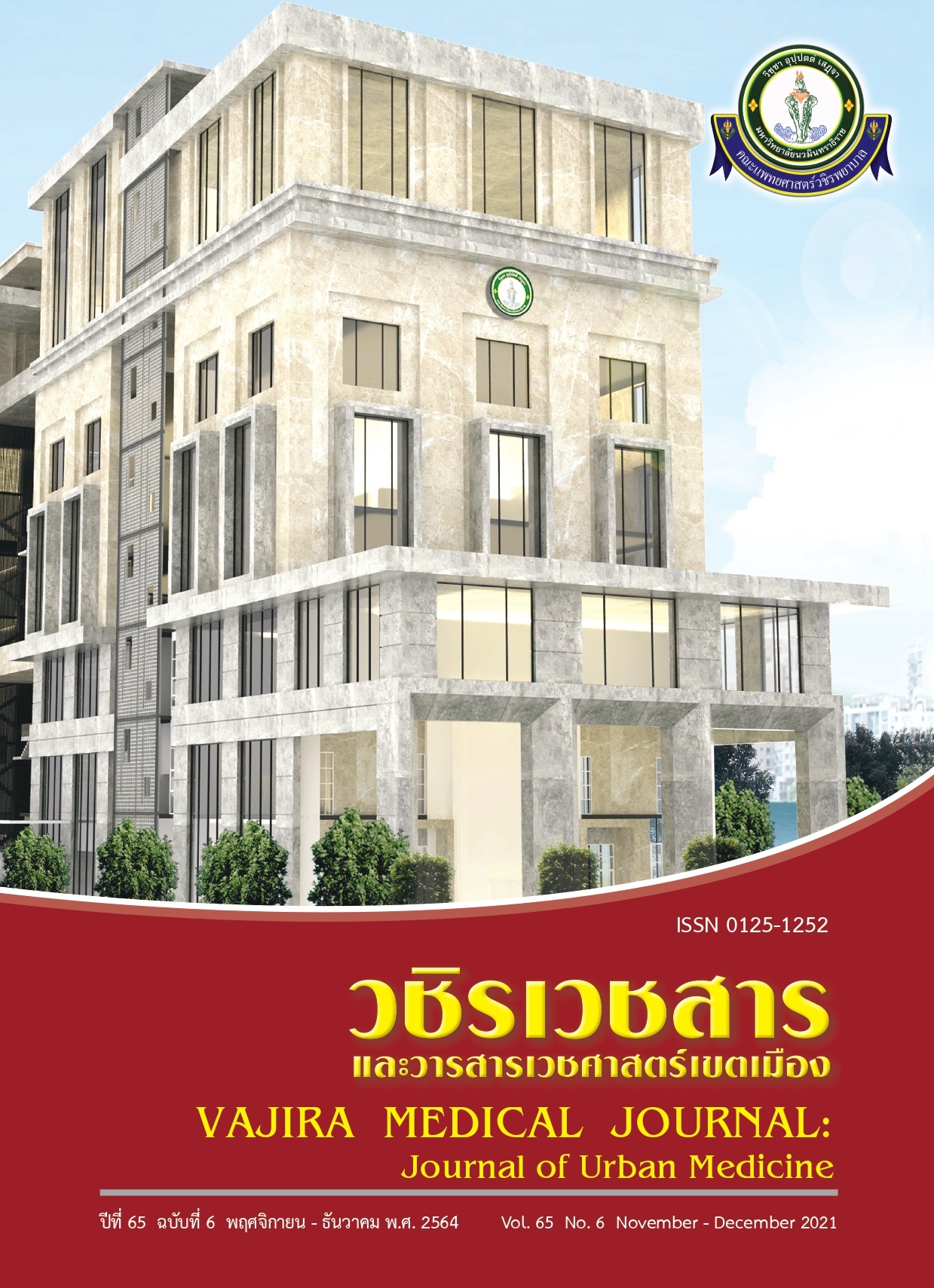Developmental and Behavioral Risks in Children Raised at Home, Compared with Children Who Attend Child Care Centers
Main Article Content
Abstract
Background: Parenting and participation in interactive activities are both influence on child development. Thai children usually live as extended families, or attend in various standard of child care centers. So, the children who raised at home and those who attend child care centers are also learned the different practices, and we cannot imply where is better for the children.
Objectives: To compare the prevalence of developmental and behavioral risks in children raised at home and those who attend child care centers. Additionally, to find out the associated factors to these problems.
Methods: The caregivers of children aged 1 to 5 years old from Pediatric Outpatient Department Srinagarind Hospital Faculty of Medicine Khon Kaen University, the Demonstration Daycare Centers, and the child care centers under the Subdistrict Administration Organization participated. Data has included the parent questionnaires and evaluated with the Thai version of Parents’ Evaluation of Developmental Status (PEDS). The data were analyzed to compare descriptive statistics and multivariable logistic regression was used to explore the associated factors on developmental and behavioral problems.
Results: The fifteen percent of all the participants reported positive of the developmental and behavioral concerns by the PEDS questionnaires, 55% of these were raised at home and 45% were child care center attendance (P = 0.254). The child’s gender was the only associated factors of child developmental and behavioral risks. However, child center attendance was not found as the significant factor to developmental and behavioral risks.
Conclusion: The prevalence of developmental and behavioral risks in the children raised at home and those who attended child care centers did not differ, neither both kind of child care centers. Thus, the developmental and behavioral risks were not mainly relied on the place children raised.
Downloads
Article Details
References
Engle PL, Fernald LC, Alderman H, Behrman J, O’Gara C, Yousafzai A, et al. Strategies for reducing inequalities and improving developmental outcomes for young children in low-income and middleincome countries. Lancet 2011;378(9799):1339–53.
Walker SP, Wachs TD, Gardner JM, Lozoff B, Wasserman GA, Pollitt E, et al. Child development: risk factors for adverse outcomes in developing countries. Lancet 2007; 369(9556):145–57.
Walker SP, Wachs TD, Grantham-McGregor S, Black MM, Nelson CA, Huffman SL, et al. Inequality in early childhood: risk and protective factors for early child development. Lancet 2011; 378(9799):1325–38.
Barros AJ, Matijasevich A, Santos IS, Halpern R. Child development in a birth cohort: effect of child stimulation is stronger in less educated mothers. Int J Epidemiol 2010; 39:285–94.
Shah R, Sobotka SA, Chen YF, Msall ME. Positive parenting practices, health disparities, and developmental progress. Pediatrics 2015(2);136:318–26.
Glascoe FP, Leew S. Parenting behaviors, perceptions, and psychosocial risk: impacts on young children’s development. Pediatrics 2010;125(2):313–9.
NICHD Early Child Care Research Network. Familial factors associated with the characteristics of nonmaternal care for infants. J Marriage Fam 1997; 59(2):389–408.
Marks KP, LaRosa AC. Understanding developmental-behavioral screening measures. Pediatr Rev 2012; 33(10):448-57.
Johnson CP. Using developmental and behavioral screening tests. Pediatr Rev 2000; 21(8):255–6.
Waitchaporn C, Theeranate C. Using parents’ evaluation of developmental status (peds) to detect developmental and behavioral problems in well-baby clinic at Phramongkutklao Hospital. Thai J Pediatr 2011; 50:59–68.
Thompson LA, Tuli SY, Saliba H, DiPietro M, Nackashi JA. Improving developmental screening in pediatric resident education. Clin Pediatr (Phila) 2010; 49(8):737–42.
Schonwald A, Huntington N, Chan E, Risko W, Bridgemohan C. Routine developmental screening implemented in urban primary care settings: more evidence of feasibility and effectiveness. Pediatrics 2009; 123(2):660–8.
Theeranate K, Chuengchitraks S. Parent’s Evaluation of Developmental Status (PEDS) detects developmental problems compared to DenverII. J Med Assoc Thai 2005; 88Suppl 3:S188-92.
National Institute of Child Health and Human Development. The NICHD study of early child care and youth development. Findings for children up to age 4½ years. Bethesda (MD):NICHD; 2006.
Loeb S, Bridges M, Bassok D, Fuller B, Rumberger RW. How much is too much? The influence of preschool centers on children’s social and cognitive development. Econ Educ Rev 2007;26:52–66.
Glascoe FP, Trimm F. Brief approaches to developmental-behavioral promotion in primary care: updates on methods and technology. Pediatrics 2014; 133(5):884–97.
Eshel N, Daelmans B, de Mello MC, Martines J. Responsive parenting: interventions and outcomes. Bull World Health Organ 2006;84(12):991–8.
Decreasing rate to 20% of developmental delay among Thai children, but still high in some area ASTV Manager Online [Internet]. 2015 [cited 2015 Nov 25]. Available from: http://bit.ly/2eFhfCL
Coghlan D, Kiing JS, Wake M. Parents’ Evaluation of Developmental Status in the Australian day-care setting: developmental concerns of parents and carers. J Paediatr Child Health 2003; 39:49–54.
Pornsamrit S, Chunsuwan I, Hansakunachai T. Developmental screening by PEDS (Parents’ Evaluation Developmental Status) survey during 9 months of age at well child clinic,Thammasat University Hospital. Thai J Pediatr 2014(2); 53:136–43.
Cox JE, Huntington N, Saada A, Epee-Bounya A, Schonwald AD. Developmental screening and parents’ written comments: an added dimension to the parents’ evaluation of developmental status questionnaire. Pediatrics 2010 ;126Suppl 3:S170-6.
Woolfenden S, Eapen V, Jalaludin B, Hayen A, Kemp L, Dissanyake C, et al. Prevalence and factors associated with parental concerns about development detected by the Parents’ Evaluation of Developmental Status (PEDS) at 6-month, 12-month and 18-month well-child checks in a birth cohort. BMJ Open. 2016;6(6):e012144. doi: 10.1136/bmjopen-2016-012144


